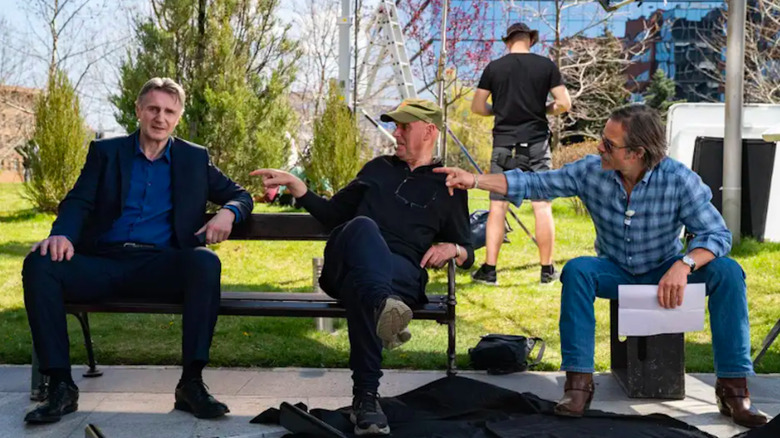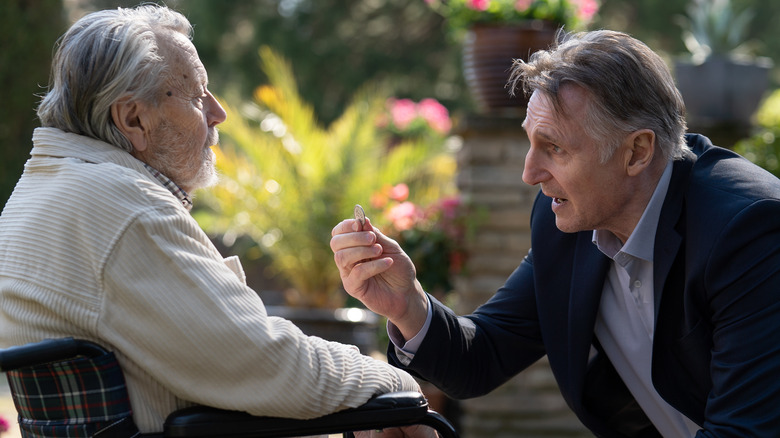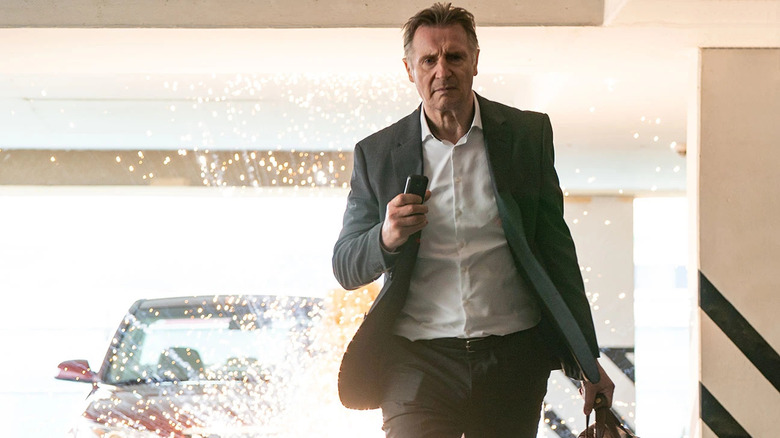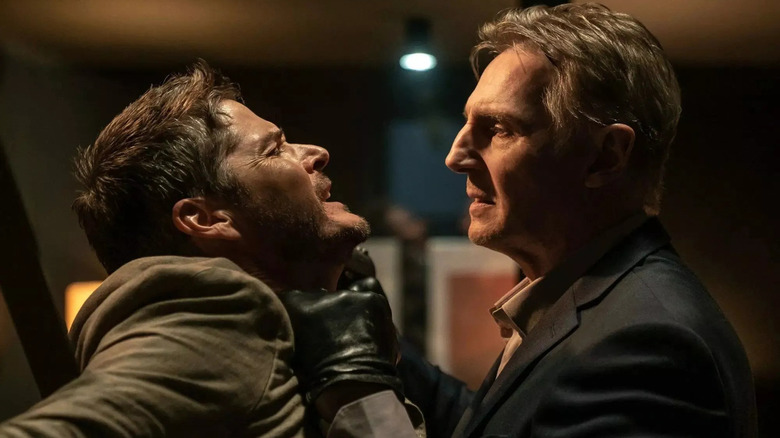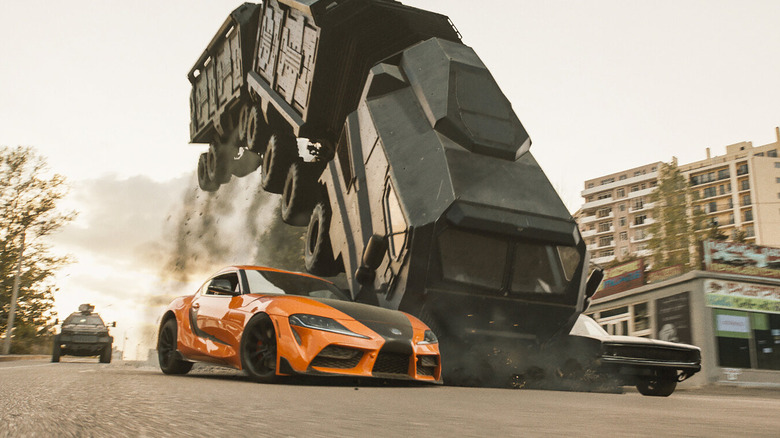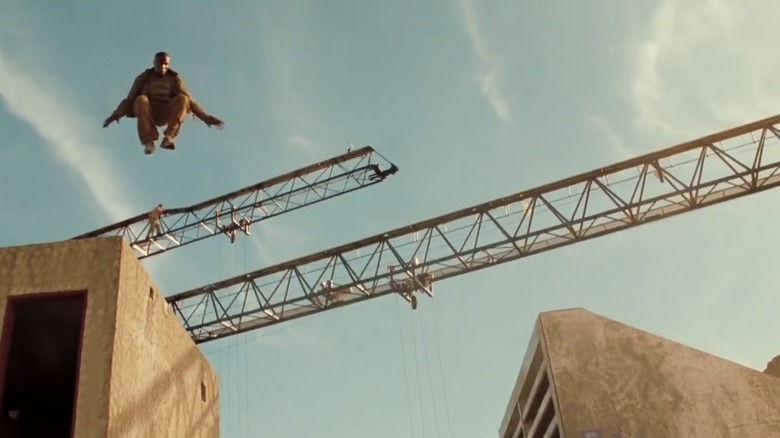Memory Director Martin Campbell On Making Action Scenes Feel Real [Interview]
Martin Campbell shoots straight as a filmmaker and a talker. He knows what he likes and what he doesn't like. For one, he's not a fan of this day and age of largely computer-generated action. The filmmaker is old-school and continues to rely on real stunts to tell his stories, including his latest film, "Memory." It's a nasty revenge movie that's more in line with his dark thrillers, such as "Criminal Law" and "The Foreigner," than his big blockbusters like "Casino Royale."
Campbell's latest is one of the few remakes in his career. It's based on the Dutch film, "The Memory of a Killer." He stuck fairly close to the original story about an aging hitman (played by Liam Neeson) suffering from Alzheimer's, but amped up the action. Recently, Campbell talked us through his approach to set-pieces, crafting believable thrills, and a few of his favorite and least favorite action scenes.
'Fear drives you, doesn't it?'
We talked right before you shot "Memory." How'd the finished film compare to what you imagined before shooting it?
You never quite know how the film's going to turn out. I mean, I do a lot of preparation on movies. I do a lot of preparation, and I go through it very carefully. I have an idea of what I want and the way I want to turn out and so forth. Well, hopefully you get some surprises, it turns out a little better than you hoped. Certainly not worse. I always start a movie like I've never directed a movie before, so it's always that fear effect that you're going to screw up, basically.
That approach makes sense since you tackle several different genres, too.
Yeah, I know. Well, it's fear really. Fear drives you, doesn't it? That you're going to screw up and that you hope you're going to be able to get through to the end of the schedule without screwing up.
Even though you've made a variety of movies, do you see a unifying vision in your filmography?
A lot of them are thrillers. I mean, you look at "Edge of Darkness," it's a thriller, you can look at "The Foreigner," that was a thriller. I did "The Protégé," again a thriller — a genre thriller, if you see what I mean, a female assassin story. "Memory" is a thriller, but this is different in the sense [that], I think, it's more complex, and the characters have a little more depth, perhaps, and [it's] more interesting because of the nature of the story.
Early on, my first film was a film called "Criminal Law" with Gary Oldman and Kevin Bacon. Again, I love thrillers. Years ago I saw "The Manchurian Candidate," the John Frankenheimer version, which was tremendous, ad that really put me on the road to doing thrillers. The one film after "Criminal Law" I did was a film called "Defenseless," which was not a good film. I did a film for HBO called "Cast a Deadly Spell"...
Great fun.
It's sort of weird. I remember being offered it and saying, "I can't do this. This is not me. It's completely nuts, this movie, there's no way I can do this." My wife said, "Well, you should get out and do it. That's all the reasons you should do it, because you think you can't do it."
What were your fears about "Memory"?
Well, the Alzheimer's aspect of it — can we get that right, for example. We plotted it out very carefully. We start out where he simply forgets where he puts the key to his car. I mean, we all do that. But then, of course, it progressively gets worse. So by the end of it, he's very advanced with Alzheimer's. Now we've only got a film that lasts 110 minutes, so in real life, of course, that could be years.
Also, it's a complex plot. There are different strands to it. There's the whole Guy Pearce side of things. There's the Hugo side of things, the Mexican side of things, right? There's corruption within the DA. It had all the different strands of the story that were quite complex. Making the story clear was a challenge.
What work did that require?
I do a lot of work on the script in terms of construction and so forth for the film to make sense. I have a pretty good story sense. I just know if you don't, you end up in a preview and on the cards it says, "What the hell was all that about?" I mean, Jesus, you know what I mean? I want to avoid that, so I do a lot of work to try and make sure the narrative makes sense and that people will understand the movie.
'The biggest bastard in the world'
You have a very good understanding of what's appealing about the movie stars you work with, what makes them charismatic and how audiences perceive them. With Liam Neeson, did you know casting him as a far from heroic character would be a strength given how mainstream audiences perceive him now?
Sure, and I remember coming up with the first scene in the film where he gets the guy. I wanted to just shoot the Liam Neeson reputation in the foot, right from the opening scene. In "Once Upon a Time in the West," there's a brilliant scene with Henry Fonda, who had played good guys his whole life, right? And then he kills that family, and my God, when he kills that 12 year old kid. Every film he had done in his life, he was playing a good guy, and suddenly he now turns out to be the biggest bastard in the world. I had to establish Liam right from the beginning, as to who he was.
The violence is still brutal in that movie, too.
It's a brilliant movie. Brilliant movie.
When did you know you had an eye for clarity, especially when it comes to action?
I think in television. I did 10 years at the BBC and ITV in London, and did a lot of dramas, a lot of limited series and stuff. I learned there, I cut my teeth. You're making mistakes on TV, it's not so bad because people watch it and you're not under the same scrutiny.
Over the 10 years I worked in TV. I cut my teeth in terms of storytelling. I did a series called "The Professionals" early on, and I did an episode I thought I did a really good job on. I remember the producer hauling me up and basically telling me I screwed up. He said, "You're not paying attention to the story." So while the shots were great and the action was good, the story was a mess. A part of it was my direction. I'll never forget that. He dressed me down for my storytelling abilities. I learned a lot from that, and ever since then, I pay a lot of attention to the narrative.
'I never, ever look at an assembly as a movie'
Any other lessons that have stuck with you from your TV days?
Well, I would do all sorts of great shots and tons of energy and people running about. There's an old adage in the theater, though, if you've got a big speech, stand still, right? I learned that on "Memory" when Guy gives his speech at the end there, in the hospital. That is one shot and he doesn't move.
I was doing all sorts of fancy shots early on, which was muddying the whole narrative. There are times where you've just got to, in order to tell the story, you have to choreograph it, so there are times where you metaphorically stand still — you know what I mean? — to tell the story. But originally, I was into the action and everything else, [and] that blinded me. He was quite right, the producer. Absolutely right. They stay with you, those sort of criticisms.
Plus, stillness is great, like you said. A lot of big actors aren't good at it.
Yeah, or they wave their arms way too much. There's another classic. There's a lot of bad habits or ticks, I think, you see. I mean, look at Al Pacino. Have you ever seen hand waving like that? See what I mean? Marvelous actor, but his hands are like two propellers, and now there are airplanes flying about you.
[Laughs] What stands out to you when you're filming and editing a Liam Neeson performance?
Well, I always make sure I get the performance on set, obviously. When I go into the editing room, I never, ever look at an assembly as a movie. I can't face it. I simply can't face it. What I do is, my editor assembles the movie. I never look at an assembly, and I start on reel one, and I go through every take I shot on every setup, to look at performance. Sometimes I'll transfer a line from take two to take six. I do a lot of that sort of thing. That's a better delivery on take three for that line. I know what I want. I know the way the scene should be cut because that's the way I shot it. I don't do master shots. I just shoot what I need.
Not much coverage then even with the action?
No, I don't. I don't do the wide shot, the mid shot, the closer shot, I don't do that. No, no. I do the John Ford technique, really, which is you just cut the clapperboards out and join it up. I mean, not literally that, but that principle.
'The action is so preposterous, it's just boring'
When you go to the movies and see action, you can easily tell when it's mostly coverage and just been thrown together in the editing room?
I can tell, but I can go to a film like the last "Fast and Furious," which I walked out of, because the action is so preposterous, it's just boring. You know what I mean? The physics of the thing is ludicrous. It's just like watching wallpaper. I actually walked out of that movie because the action was what they thought was spectacular. Of course, it made a ton of money, being based on the franchise, but it was a lousy film. None of the action is character-based. It's all visceral nonsense whereas the early ones were terrific.
You look at "Die Hard," for example, the best movie was the first one, by far. Why? Because you believed it, you believed the action. It had its feet well and truly on the ground. You had a great villain. It was in one building, right? The subsequent ones became bigger and bigger and bigger and bigger, and they were less and less and less and less.
Any action movies recently you've really enjoyed?
God, I'm just trying to think. I liked "The Batman," but I thought the action was okay. I didn't think it was brilliant, the action in that movie. I saw the Michael Bay movie, "Ambulance."
Fun, right?
It's sort of fun. I mean, if you've got epilepsy, you should never go and see a Michael Bay film, but it's kind of fun. And because you've got Jake Gyllenhaal and Yahya Abdul-Mateen II, who's a terrific actor, and Eiza González was good too. There were 48 cuts every two seconds, but he really does get some brilliant shots. It is a slightly preposterous notion, the whole thing, it's fun, and I actually sat back and enjoyed it. Whereas his previous one, for Netflix, I just couldn't watch.
Terrible.
"Underground 7" or something.
What'd you think of the drone photography in "Ambulance"?
I think he had five drones, didn't he? He had them all blasting on every set up. I think in his closeups, I think those are all static, he just shoots them on very long focused lenses, right? He moves the camera, jostles the camera, and the cuts are so fast. I think that's what he does. I remember reading an article, and that's what he does. It all works.
'If it's perceived to be real, it works'
You two are a few of the filmmakers still at your level making very practical action.
Absolutely. And in Bond, "Casino [Royale]," for example, in the big parkour sequence, there's not that much digital in that. Obviously wire removal when you're standing on top of the crane, but beyond that, it's mostly all practical.
Movies like "The Foreigner," "The Protégé," and "Memory," they're all R-rated thrillers for adults. Even though you have stars, are you finding them tougher to get made?
The budgets are pretty small compared to the studio movies. You always go to a place where the tax break is terrific, and you get the best for your buck, is what you do. You have to go somewhere to shoot this stuff, where you can get what you want. I think we had 55 days on this to shoot. A lot of it was shot in Bulgaria because of terrific crews, it's cheap to shoot. For interiors, there's three or four studios here.
We went to El Paso, obviously, to shoot some stuff there. But again, tight budgets and so forth, but you can make it work. The only thing that makes me laugh is the action scene on the boat. There's no water within 100 miles of bloody El Paso except that manmade lake, which is about two hours out of El Paso.
All a part of suspension of disbelief, of course, but how much, especially with action movies, do you think you can get away with when it comes to audiences?
I always take the attitude, with action, particularly, that it's real, that if it's perceived to be real, it works. In "Casino Royale," they climb up cranes, they do all that stuff, right? It kind of looks real. It's ludicrous, actually, if you really think about it, but it gives the perception of being real. Jumping from one crane to another, and then jumping 58 feet onto the roof, is madness, in a way. But the guy did it with a wire and so forth, and the perception is real.
In the case of "Memory," I tried to keep all the action as real as possible. For example, you see movies where they're beating the hell out of one another, and there's not an ounce of blood. They get up, they keep punching each other. It's all very flat. They always have a little bit of blood on their nose. Yeah, give me a break.
And there's rarely exhaustion.
That's exactly right. There's a great film, "The Big Country," that was directed by William Wyler, with Charlton Heston and Gregory Peck. You should see that movie if you haven't. There's a fight in there where Heston and Peck fight all night. They just go into this corral and they start beating the s*** out of one another, and it goes on. And by the end of it, they're crawling. Neither of them can actually get up. They're crawling on their hands and knees. They're so exhausted. It's a classic fight.
"Memory" opens in theaters April on 29, 2022.
